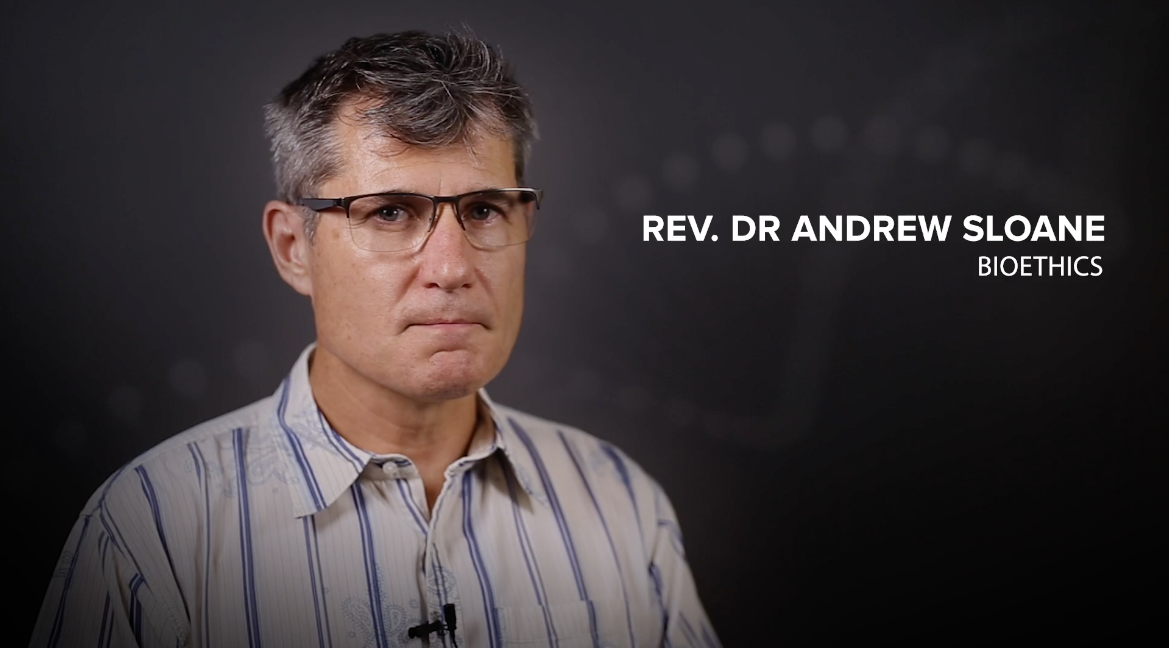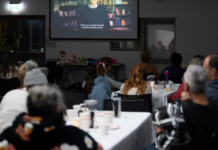 Covid has become the shape of life for all of us, and there are important questions around a number of areas to do with the pandemic that we all need to address – particularly as Christians. With this in mind, Morling College recently held an online Bioethics Forum run by Rev Dr Andrew Sloane. Andrew is Senior Lecturer in Old Testament and Christian Thought at Morling College, teaching in the areas of integration of faith and work, OT exegesis/interpretation, philosophy of religion and bioethics. And before going into Baptist ministry, he qualified in medicine and practiced briefly as a doctor. Below is a summary of what Andrew shared at the public forum regarding his thoughts on lockdown, vaccinations, and vaccination passports.
Covid has become the shape of life for all of us, and there are important questions around a number of areas to do with the pandemic that we all need to address – particularly as Christians. With this in mind, Morling College recently held an online Bioethics Forum run by Rev Dr Andrew Sloane. Andrew is Senior Lecturer in Old Testament and Christian Thought at Morling College, teaching in the areas of integration of faith and work, OT exegesis/interpretation, philosophy of religion and bioethics. And before going into Baptist ministry, he qualified in medicine and practiced briefly as a doctor. Below is a summary of what Andrew shared at the public forum regarding his thoughts on lockdown, vaccinations, and vaccination passports.
–
Q: How should we make sense of the lockdown?
A: This depends on your view, and theology, on governments. A number of people who are opposed to lockdowns adopt a fairly minimalist view of what government is – restricted to establishing systems in which people can pursue their lives with the prevention of common harm. Even with that view, it seems that public health orders are justified. We’re familiar with these kinds of policies in a range of contexts: we mandate seatbelts in cars, safety fences around pools, food safety laws in restaurants, etc. They’re restrictions on our freedom, but governments are entirely warranted in putting them in place. The reasons behind them are clear; there’s a concern for basic fairness, and systems that prevent harm. These decisions are made on a balance of risks, costs and benefits, including health and social/economic factors, and what’s going to be of most benefit to the community as a whole. There are good reasons to believe lockdowns have limited the number of infections and associated serious illness and death from what we might otherwise have seen from this virus…We must not invest our hopes in our elected officials and their plans and programs. Theirs will always be a partial and flawed expression of God’s justice. But, as seen in Psalm 72, our politicians can aspire to shape societies that better reflect that justice. Lockdowns in general serve a good and just purpose.
…But I do have some concerns! I have concerns around the way that fear has dominated the narrative around restrictions. I do think it’s an unhelpful environment to foster. Especially given that for most of us our baseline levels of stress, grief and fatigue are significantly above normal. Fear does not form good patterns of relationships and adds to our stress levels, with damaging effects on our physical and emotional wellbeing. I also have concerns about some elements of the restrictions, particularly around the care of people with disabilities, those with mental health concerns, people in nursing homes and those in end of life care. For example, it’s deeply disturbing to know that residents of aged care facilities have not been allowed to engage in meaningful social interactions. They have restricted contact with their paid carers, depersonalised by PPE. They have little contact with other residents and no access to communal activities. They’ve not even been allowed to have close family members visit at the end of their lives. This is well-intentioned and designed to keep them, and those who care for them, safe. But it has come at a significant cost to their wellbeing and mental health. I recognise that these are very hard decisions to make and there is no simple solution. But I would suggest that we need to think about a broader range of goods as we’re trying to set the dials. Think about how the experience of meaningful community for those who are often already significantly alienated contributes to their wellbeing, and perhaps allow people in these settings to balance the risks they are willing to take (without risking others) with increased social contact.
Q: How can we address ethical vaccination concerns?
A: One concern is that the production and use of these vaccines makes us complicit in past evil – particularly evils associated with abortion. What we’re talking about is the use of a particular line of cells in the testing of the vaccine’s safety. (We’re not talking about the use of a fetus per say – it’s cultured kidney cells used in the early testing phase, not in the production of the vaccine, and there are no fetal or embryonic cells in the vaccine itself.) The cell line was cultured from the kidney of an aborted fetus. Does that make the manufacturers and recipients of the vaccines complicit in the moral evils attended to abortion? Not in my view. We don’t know why that particular pregnancy was terminated; perhaps it was for morally permissible reasons. We are fairly confident it was not terminated for this purpose, nor did this use factor into the decision.
Q: How can we address health vaccination concerns?
A: Only time can tell us if there are time-based effects. Over time the population sample will increase. We have over 18 months, and a growing body, of data on the safety of the vaccines. We also have very clear data on the long-term effects of the disease. We know that the risks of not getting the vaccine and getting the disease, and its long-term consequences, are very significant. We don’t have the luxury of waiting. One risk you do not have to worry about is the vaccines corrupting your DNA. mRNA is simply a novel way to trigger an immune response against a dangerous organism – the kind of thing we’ve been doing now for over a century – and it has not contact with your DNA. There are other risks – the known effects of the clotting disorder of the AZ vaccine, etc. So, we do need to think about risks. But I don’t think we need to worry about them. Firstly, the risks are very small. Secondly, the risks of the alternative are so clearly more significant. Getting ahead in vaccination rates limits the damage it might do – especially to those most at risk (e.g. the elderly). Vaccination is a way of serving others. Some people might have concerns about mandating vaccination for, say, healthcare workers. But this is actually just an extension of an existing policy for healthcare workers. They’ve had to have proof of relevant vaccination for some time. I recall having to have a current TB vaccination before I could do clinical placement as a medical student back in the 80s. It’s designed to protect people working in high-risk environments, and those they care for, from harm. I’m puzzled as to why anyone who is eligible for the vaccine would not jump at the chance of getting it. We know they dramatically reduce the risk of illness and death. For your sake, and the sake of others, go get vaccinated!
[A quick message from Steve Bartlett (DoM): Can I encourage you, where appropriate, to point people to credible sources of information that would assist to alleviate vaccination concerns. A vaccination information sheet can be found here, and resources are also available across a number of languages here.]
Q: What about concerns about “the mark of the beast”? Or government coercion?
A: Throughout Christian history, all kinds of things have been identified as the mark of the beast, and all have been wrong. In Revelation, the mark is associated with worship of the emperor and buying into an unjust system. I can’t see how the vaccine fits there. Pastors, you must simply help people understand what the book is saying and what it’s not saying. In regards to concerns around government coercion: At the moment I’m not seeing the use of force from the government. What we are seeing is the use of incentives (greater freedoms) which aren’t random, but based in reason – because people who have been vaccinated are a significantly reduced danger for others. That doesn’t seem coercive to me.
Q: How can we address Christians who won’t receive a vaccination passport?
I question whether we’re actually denying objectors to vaccines access to worship per se. If implemented, it would exclude them from a particular form/experience of worship. I’ve had access to worship through my church community over the last couple months though it’s not been in person. I would suggest that those people think very carefully about their responsibilities. There will be people in a church for whom it is medically unwise to get vaccinated, and they will then be most at risk if you attend unvaccinated. Think pretty hard about that. Rights are good and helpful, but rights always have reciprocal obligations. As Christians, our primary concern should be with our responsibilities. How are we contributing to the well-being of those around us? I have a responsibility to do what I can to limit risk to those who would suffer the most.
Q: How can we address groups that push statements as being the ONLY Christian response to Covid?
A: I hope these thoughts that I’ve shared don’t foster that impression! One thing we must do is be willing to sit with difficult questions. Most of the church communities I am aware of see themselves as being good at providing answers, but bad at wrestling with hard questions – and recognise that there might be no easy answer to some to them, or that people might come to different views. I would like to see churches where we’re able to foster meaningful, hospitable conversations…Where we hold firm to the things we know to be true, and recognise the limits to our knowledge. Where we treat charitably those who might disagree with us, and recognise that our common commitment to the Lord Jesus is what binds us together, and we do not need to force conformity.





























